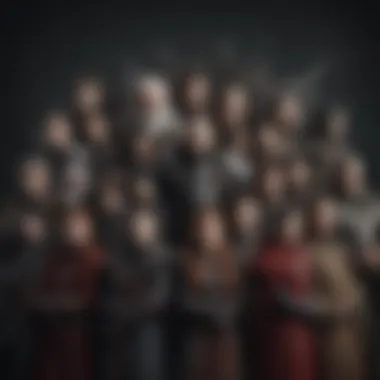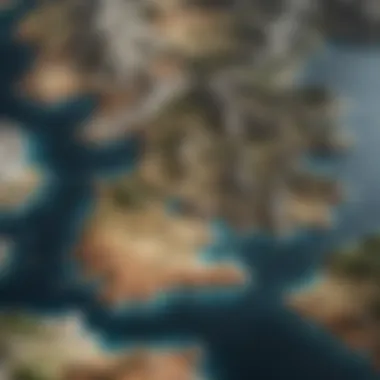A Comprehensive Exploration of Game of Thrones: Characters, Themes, and Cultural Impact


Intro
This article delves into the universe of 'Game of Thrones,' a modern epic that melds complex character arcs, intricate themes, and impactful cultural narratives. The series, based on George R.R. Martin's works, deserves a careful exploration. Its influence expands beyond mere entertainment and into critical discussions on morality, power, and human nature.
With multiple layers to dissect, this piece aims to guide readers through significant aspects of the series. From character dissections to lore explorations, we look at how the intertwining stories unfold. Pop culture references and fan theories will further one’s appreciation and understanding of this monumental series.
Character Dissections
Detailed Analysis of Key Characters
The characters of 'Game of Thrones' are robust and highly evolving, making their analysis significant. Each character evokes a distinctive response, leading viewers to reflect on themes of ambition, loyalty, and betrayal.
Eddard Stark serves as a moral compass, embodying honor in a world where it often leads to demise. His decisions set the grave consequences into motion, leading to chaos in the Stark family. Then there’s Daenerys Targaryen, whose transformation from a meek girl into a powerful leader showcases the series' theme of self-discovery. Her struggle for power and identity raises questions regarding leadership and justice.
Character Development Throughout the Series
The series meticulously charts changes in characters through dramatic arcs. Jon Snow, initially viewed as an outcast, ascends into a complex figure commanding the Night's Watch. His journey showcases sacrifice and finding one’s place in a morally ambiguous world.
In contrast, Cersei Lannister’s development morphs from a victim of circumstance to a frenzied seeker of power, illustrating how desires can corrupt. The interplay of motivations provides depth to the story, pulling viewers into personal stakes.
Impact on the Overarching Storyline
The arcs of these characters do not function in isolation. They are interlinked, producing a rich narrative tapestry that affects the outcomes throughout the series. Character fates intertwine, creating powerful resonances throughout seasons.
Episode Explorations
Recap of Significant Events in Each Episode
As viewers rewatch episodes, the depth appointed to each can be sensed. The first episode,
Prelude to Game of Thrones
'Game of Thrones' is not just a television series; it is a cultural phenomenon that has reshaped television landscape of the early 21st century. The intricate weaving of characters, complex themes, and rich world-building serve as a testament to why this series resonates with so many.
Understanding 'Game of Thrones' demands scrutiny of numerous components that come together to form its identity. The series invites viewers to explore a variety of conflicts that mirror societal structures and relationship dynamics, which mold both choices and motivations of individuals within the story. Only through this comprehensive understanding can one truly appreciate the multilayered narratives presented throughout the series' mysterious backdrop of Westeros.
Overview of the Series
The series, based on George R.R. Martin's 'A Song of Ice and Fire' novels, first premiered on HBO in 2011. Over eight seasons, it attracted millions of viewers and sparked discussions on multiple fronts, ranging from acting to moral authority in leadership. The episodic format allowed for extensive character development, enabling audiences to establish a connection with the inhabitants of this bold and often brutal world.
Each character offers a standpoint that viewers can relate to, whether drawing admiration or disdain. Such multifaceted portrayals only add to the cultural significance, reflecting humanity's most profound dilemmas alongside personal ambitions.
Context and Creation
The creation of 'Game of Thrones' involved meticulous planning and a tireless commitment to authenticity. The collaboration between showrunners David Benioff and D.B. Weiss played a pivotal role in shaping the narrative and visual style. Their endeavor demanded an understanding of not only the original materials, but also the necessity to appeal to the screen.
This combination of adherence to source material while contending with the demands of a mass audience elucidates the importance of adaptation as an art form. Additionally, the casting decisions remarkably enhanced character authenticity, recruiting talents like Emilia Clarke, Kit Harington, and Peter Dinklage, who offered memorable performances that made the series iconic.
With elaborate settings ranging from King's Landing to the icy expanse beyond the Wall, the production teams worked tirelessly to construct an authentic historical feel to complement the fantasy elements. The efforts culminated in a series that captivated a global audience, and it continues to impact both future television productions and audiences alike.
Thematic Analysis
The thematic analysis of Game of Thrones allows viewers to see how deeply intricate storytelling goes. This section highlights pivotal themes such as power dynamics, loyalty, betrayal, mortality, and fate. Each of these themes resonates throughout the series, influencing characters' motivations and shaping their destinies. Understanding these themes helps fans appreciate the moral complexities faced by characters and derive lessons that are relevant to real-world situations. The interwoven themes enhance the narrative depth, making it vital for both casual viewers and dedicated fans to grasp these concepts for a fuller experience of the series.


Power and Ambition
This theme is arguably the backbone of Game of Thrones. Several key characters, such as Ned Stark and Cersei Lannister, showcase the extremes people will reach to gain power and keep it. Ambition can lead individuals to achieve greatness, but as seen with personal tragedies that befell Daenerys Targaryen or stark downfall of Robert Baratheon, it also brings about moral ambiguity. Furthermore, the series presents an unsettling portrayal of ambition often bordering on the ruthless. Characters are faced with decisions that question ethical boundaries and their personal values when chasing power. Viewers witness how actions blind characters to the consequences of power, leading to inevitable consequences.
Loyalty and Betrayal
Loyalty is frequently tested in Game of Thrones. Central to the relationships formed across Westeros, loyalty influences decisions between friends, family, and political allies. Characters like Jon Snow embody unwavering loyalty, while others, such as Petyr Baelish, manipulate those bonds for selfish gains. Betrayal is an inevitable part of these relationships, showcasing its devastating impact. Listeners are shocked by twists, like Robb Stark's betrayal during “The Red Wedding.” Many characters come to understand that those closest to them may not have their best interests at heart. This theme opens discussions on trust's fragility in a world driven by conflicting interests and harsh realities.
Mortality and Fate
The theme of mortality in this series is pronounced. The omnipresence of death creates a somber tone that permeates every storyline. Characters must continuously confront their own mortality. This theme informs the choices made by individuals; they must choose actions quickly, aware that their time could end at any moment. Game of Thrones rejects the notion of guaranteed success or survival, imparting a sense of urgency. Notably, the infamous Night King, serves as a potent symbol of fate's inevitable arrival, emphasizing that no effort in this lethal world can swear protection from death. Furthermore, the unpredictable nature of life in Westeros shapes not only personal narratives but echoes larger philosophical reflections on what control and destiny encompass.
Character Dissection
The exploration of individual characters within Game of Thrones offers a critical understanding of the series. Character dissection reveals how personal motivations, relationships, and arcs contribute to larger themes and narratives. Each character serves as a lens to examine power dynamics and the influence of the socio-political landscape of Westeros. Studying these characters not only enriches the viewing experience but also offers insights into the human condition.
Jon Snow: The Reluctant Hero
Jon Snow embodies the archetype of the reluctant hero in Game of Thrones. His journey is filled with moral dilemmas and the formative challenges that define him. From a young age, he struggles with his identity as the supposed illegitimate son of Eddard Stark. He feels an inherent sense of honor, which Spurs him to take on the responsibility of fighting the threats beyond the Wall.
His leadership journey is marked by setbacks and pivotal choices, including his appointment as Lord Commander of the Night's Watch. This evolution highlights Jon’s internal battles as he navigates loyalty, honor, and personal sacrifice. Ultimately, his development raises questions about what it means to be a hero in a morally ambiguous world.
Daenerys Targaryen: The Rise and Fall
Daenerys Targaryen exemplifies an intriguing narrative of empowerment that veers into tragic authoritarianism. Initially, she begins as a pawn in her brother's quest for power, but as she embraces her heritage, she transforms into a formidable force. Over the seasons, her growth reflects not only the desires for revenge and reclaiming the Iron Throne but reflects the intolerance that might accompany such power.
Daenerys’s initial compassion progressively blurs, particularly in the later seasons. Her decisions often show a shift from idealism to ruthlessness, where her accusations of tyranny and betrayal weaken her vision for a just ruling. This complexity invites viewers to ponder her psychological evolution and the toxic allure of her quest for power.
Tyrion Lannister: The Witty Strategist
Tyrion Lannister stands out as a character defined by intelligence rather than brute strength. Born into a family that openly resents him for being a dwarf, he learns to navigate the treacherous political waters of Westeros through wit and understanding of human nature. His dialogues are priceless, filled with piercing insights and sarcasm, devoid of the arrogance typical of the other members of House Lannister.
His time in captivity, alliance formation with Daenerys, and strategic maneuvers illustrate how he redefines himself outside the constraints imposed by his family. Tyrion signifies the power of the mind as opposed to the sword, showcasing that in a world rife with violence, intellect can be a way to survive. Despite his cleverness, his vulnerabilities are alive and share with the audience the essence of human frailty.
Cersei Lannister: The Iron Queen
Cersei Lannister is a pivotal character who operates through a lens of cunning and ambition. Deeply mired in a patriarchal society, she wields power through passive aggression and meticulous plotting rather than open warfare. Cersei's character challenges traditional gender roles in Game of Thrones, revealing the lengths to which she is willing to go to protect her children and secure her power.
Her transformation from a protective mother to an unyielding tyrant illustrates the maxims of paranoia, vengeance, and the cost of absolute power. Cersei’s fierce drive places her at the epicenter of conflict throughout the series, reflecting the destructive qualities of familial loyalty and the personal toll taken by her ruthless ambition.
The intricate characters of Game of Thrones do not exist in isolation. Their narratives interact and often contrast sharply, defining the larger saga of human complexities interwoven in themes of struggle, moral ambiguity, and the pursuit of power.
Episode Breakdown
The 'Episode Breakdown' section serves as a crucial pillar in understanding Game of Thrones. This television series, based on the book series published by George R. R. Martin, unfolds across multiple episodes that craft the narrative into an engaging journey. Focusing on significant episodes and climactic moments allows fans and new viewers alike to see how each piece contributes to the larger tapestry of the story. The structure of the series makes it necessary to analyze each episode, as they bring to light character development, major plot twists, and thematic depths that resonate throughout the series.
Significant Episodes and their Impact
Several episodes stand out for their exceptional artistry and prowess in storytelling. Certain key episodes serve as crossroads where characters face choices that alter their fates irreversibly. For example, "The Rains of Castamere," known more universally as the Red Wedding stands out not only for stark plot changes but also for its emotional potency. It challenges the notion of security in the universe of Westeros, asserting that no character is truly safe.
Another significant episode is Season 6's "Battle of the Bastards." This episode exemplifies not only the spectacular production values of the show but also personifies the ongoing struggle for power between Jon Snow and Ramsay Bolton. The visceral experience lays bare the harsh realities of ambition where brutality often overrides loyalty. Here are several noteworthy episodes that resonate with impact:
- "Winter is Coming": Establishes characters and the series’ ominous tone.
- "The Lion in the Widow": Functions as Cersei's treacherous ascent.
- "Hardhome": Highlights the lurking threats of the White Walkers.
Each presentation finishes by reemphasizing the strains of morality, sisterhood, and revulsion. Such moments illuminate the way Game of Thrones addresses complicated relationships within and between houses while positioning them against personal aspirations.


Climactic Moments in the Series
Climactic moments are where tension peaks, leaving lasting impressions on the viewers. Whether through unexpected character deaths or confrontations, these instances are performances that solidify the story’s unpredictable nature. For instance, the climax of Daenerys Targaryen's character arc stretches jaw-droppingly toward her decision in King's Landing.
Furthermore, the moment of Arya Stark's redemption through the elimination of the Night King delivers not only a tactical victory but serves as one of the most anticipated plot-reflections throughout the series. Such turns reverberate through both character motivations and audience expectations, shaping how stories evolve.
Certainly, by focussing on these episodes and key moments, enthusiastic viewers can discern even deeper insights to the show's narrative fabric, enhancing their overall engagement with this phenomenon of modern television.
The Lore of Westeros
The lore of Westeros serves as the backbone of Game of Thrones, providing depth to its characters and narrative. Knowledge of history, geography, and political intricacies helps viewers grasp the actions and motivations driving each character. Understanding the lore also clarifies the rivalry among the various houses and the socio-political landscape.
History and Geography
The history of Westeros is extensive and influential in the stories being told. From the formation of the Seven Kingdoms to the significance of ancient houses like the Starks and Lannisters, each historical event impacts the present. Important facts include:
- The Targaryen conquest which ended during the reign of Robert Baratheon.
- The Time of Troubles, influencing the common people's distrust of the nobility and shaking the foundations of power dynamics.
- Geographical divisions that further complicate politics, such as the Wall protecting the realm from the threats lurking north and the relative isolation of Dorne.
By taking a planned route through the present political turmoil, one understands how past events foreshadow current conflicts and alliances.
House Alliances and Conflicts
The political tapestry in Game of Thrones is colored by shifting alliances and age-old grievances among powerful houses. Each house has its own sigil, motto, and history, further informing their actions and motivations. Some noteworthy dynamics are:
- The Lannisters and their wealth supporting their ambition for power, often clashing with Starks seeking justice.
- Frequent betrayals as seen between Baratheons and their loyalists or competitors.
- Fluidity of ties seen when Targaryens rise or fall, creating opportunities for adjacent factions to assert dominance.
Engaging with these dynamics not only enhances viewing pleasure but also gives insight into real-world concepts of political strategy and power plays.
Fan Theories and Speculations
Fan theories and speculations are integral to the Game of Thrones experience, serving as a fictional extension of the series that keeps audiences engaged long after episodes air. These theories contribute to a more vibrant discussion among viewers. They provide not just entertainment, but also summon critical thinking as fans decipher plot twists, character motivations, and unresolved issues that pepper the narrative.
Delving into the fabric of the show, fans sometimes create elaborate postulations that align with or even contradict existing canon. This fan interaction becomes a performative element. Theory crafting fosters community bonding, as participants often turn to platforms like Reddit to share their insights. They build upon existing theories, connecting hidden clues and synthesizing diverse opinions in an organic discourse.
One of the captivating aspects of fan theories is the ability to revisit the subtext of story elements, leading to fresh readings of both the narrative and the rich world of Westeros.
Popular Theories and Their Origins
Several fan theories have gained traction, morphing into discussions that boast considerable lore depth. One particularly notable theory revolves around the postulation that Tyrion Lannister might actually be a Targaryen. This theory finds its basis in snippet much value from character analysis and plot hints created by George R.R. Martin. Readers often reference these moments, complicating the apparent banishments of character lineage.
Another interesting theory relates to the significance of the Night King. Many specify that his purpose aligns with greater narratives in Westeros, as the White Walkers represent an existential threat that can be tied to the themes of death and continuity.
The roots of these theories come from subtle advice laid throughout the series. Observant fans utilize evidence from dialogue, screenplay nuances or strategic mistakes made by characters -- all markers serving as breadcrumbs through the vast saga.
Unresolved Mysteries
Despite significant explorations into character and plot arcs, unresolved mysteries haunt the series. Critics and enthusiasts alike ponder the absence of resolution in many areas. This has given rise to specific storylines that fans constantly dissect and debate. A classic instance is the fate of Gendry. Left rowed adrift at the show's close, his destination remained ambiguous, carrying forward potential narratives that may take root in future projects.
Another mystery that garners attention is the cryptic prophecy surrounding Azor Ahai, a legendary hero expected to re-emerge in the realm's time of crisis. Discussing various interpretations related to this tale showcases fan creativity, especially since the series did not definitively settle for a specific character housed under this prophecy.
Ultimately, fans employ a variety of framework strategies to navigate these unresolved enigmas, frequently emphasizing the potency of narrative expectation the series cultivated through its run.
"Engagement with Game of Thrones theories shifts the lenses with which we view character interactions while validating diverse perspectives around the narrative's complexities."


These ongoing discussions around unresolved mysteries not only kindle curiosity but also connect various elements across storytelling, creating further interest in the world of Game of Thrones.
Behind the Scenes Insights
Behind the scenes, the creation of Game of Thrones involved complex processes and various stakeholders. This section seeks to unravel significant insights that have shaped the product audiences saw on their screens. An understanding of these processes can illuminate how creative compromises and strategic decisions influenced the final work. Fans often appreciate knowing what led to their beloved or delegitimize pfass scenes, adding layer to their engagement with related content.
Production Challenges
The production of Game of Thrones was nothing short of a monumental feat. Filming took place in multiple countries, which brought unique challenges. Weather conditions in Northern Ireland often had to be factored into the schedule, impacting shooting times. Additionally, the series relied on immense sets and battle scenes, requiring elaborate choreography and substantial resources.
Sound challenges also arose, especially in outdoor locations where environmental noise could disrupt recordings. Moreover, crew and cast faced tactical challenges during fight sequences; injuries were a risk, and safety protocols had to be strictly adhered to.
Ensuring a high production value reinforced the commitment behind the scenes. The integration of practical effects with CGI made each scene more immersive. Overall, the mingling of creativity with problem-solving defined the production process.
Adaptation from Source Material
Adapting A Song of Ice and Fire, the novels by George R.R. Martin, posed unique challenges. First, the vast and intricate plots of the books contained extensive lore. Selecting which streams of the story to prioritize in each season required careful deliberation. Some characters had to be merged, changed, or even omitted entirely.
Moreover, the questions of pacing and character arcs especially arose when translating a dense narrative to a visual format. The first seasons largely adhered closely to the books, creating a positive reception amongst unexplored fans. However, as the series progressed, variances became more pronounced, notably in the later seasons.
Understanding these adaptations helps garner aspects of the narrative that may not have successfully transitioned from page to screen. In summary, both fans and new viewers continue exploring these adaptative choices, always keen to highlight areas of divergence.
Cultural Impact of Game of Thrones
The cultural impact of Game of Thrones extends far beyond its narrative arcs and character transformations. This section evaluates how the series shaped the television landscape, transformed fan engagement, and influenced various genres in media. Its significance lies in creating a shared experience among viewers—adapting the traditional storytelling methods while pushing boundaries of character development and moral complexity.
Influence on Modern Television
Game of Thrones challenged the norms of storytelling in contemporary television. Its reliance on intricate plots and morally ambiguous characters garnered acclaim and set a new template for premium content. Notably, other shows began to follow this formula. Recent series like The Witcher and Westworld owe some of their success to the approach pioneered by Game of Thrones.
The immense production values, high-budget episodes, and sprawling ensemble casts form part of its legacy, effectively raising the bar for television productions. Moreover, the series demonstrated that audiences are willing to invest their time in meticulously crafted narratives over myriad episodes, leading to a cultural shift in viewer expectations.
In terms of HBO's approach, Game of Thrones demonstrated that a single flagship series could redefine a network's reputation. As a result, platforms are eager to invest heavily in similar epic dramas, echoing the series’ storytelling technique and production quality throughout the medium.
Game of Thrones in Popular Culture
The pervasive influence of Game of Thrones permeates all aspects of popular culture. It has manifested in various forms, including merchandise, themed events, and fan conventions. Iconic quotes and visual references from the show often appear in memes and social media references. Its characters have inspired countless discussions, creating a global dialogue around themes of power struggles and morality.
Key examples of its cultural infusion include:
- Event Tourism: Locations used in the series attracted millions of fans to visit filming sites across countries such as Northern Ireland and Croatia.
- Social Media Interaction: Platforms like Reddit have vibrant discussions, dissecting episodes, articulating theories, and analyzing characters. There are many subreddits centered around speculations, drawing in an engaged community.
- Parody and Rip-offs: Various television and online shows have surfaced that capitalize on the essence of Game of Thrones, either through parody or homage, further embedding its impact within the broader landscape of entertainment.
“We have long been told that a visual medium should only tell simpler stories, however, Game of Thrones has displayed that not only is it possible to engage viewers deeply, but there's a massive audience hungry for intricacy in plots.”
The End and Future of Game of Thrones
The discussion about the Conclusion and Future of Game of Thrones serves as a vital concluding section to this expanded exploration of the series. As the article treads through the extensive lore, thematic intricacies, and character developments, understanding the legacy and future directions of the series becomes paramount. It is essential not only to summarize the rich narrative but also to consider its lasting influence within modern culture.
Legacy of the Series
Game of Thrones has left an indelible mark on television history, redefined the fantasy genre, and inspired countless discussions among viewers and critics alike. Its complex characters and unpredictable plotlines have contributed to a legacy that resonates even after its conclusion.
- Cinematic Quality: The show set a new standard in terms of production quality. From elaborate sets to high-intensity action sequences, the show's commitment to excellence influenced other series to elevate their production values.
- Cultural References: Words and phrases from the show have become part of everyday language, marking its footprint in popular culture. People often use terms like 'Winter is Coming' without necessarily knowing the context, a testament to its social penetration.
- Themes of Morality: The moral ambiguity depicted in characters forces viewers to confront ethical dilemmas within a fantasy world that mirrors our own. This emphasis on nuanced storytelling maintains an ongoing discourse on human nature.
"The genius of Game of Thrones is how it blends complex characters with societal issues that remain relevant today."
Upcoming Projects and Spin-offs
Following the conclusion of Game of Thrones, the franchise has not been dormant. There are plans to expand the incredible world of Westeros through various upcoming projects and spin-offs. Some significant announcements include:
- House of the Dragon: This series aims to recount the history of House Targaryen and events leading up to the Targaryen civil war. Given the rich text from George R. R. Martin’s Fire & Blood, there are high expectations.
- Other Spin-offs: Additionally, HBO is exploring other possible series that could glide through Westeros's lore, delving into areas not covered by the original show.
- Anthology-style Approach: It is plausible that HBO could implement a more anthology-like format, where each season might examine different eras within the universe, showcasing stories from both known and lesser-known houses across history.



